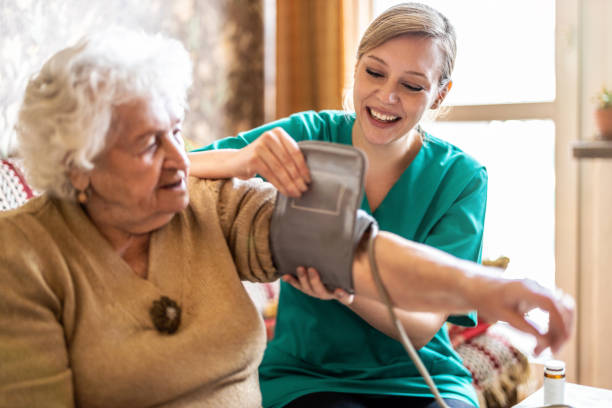The Role of the Nurse in Home Care: Delivering Compassionate and Skilled Healthcare
Home care has become an increasingly popular choice for individuals seeking personalized healthcare services in the comfort of their own homes. At the core of home care services is the nurse, a highly skilled and compassionate healthcare professional who plays a pivotal role in ensuring the well-being and recovery of their patients. In this blog post, we will explore the significant role of the nurse in home care, highlighting their responsibilities, expertise, and the profound impact they have on the lives of those they care for.
Assessment and Care Planning:

Nurses in home care are responsible for conducting comprehensive assessments of their patients’ health conditions. They gather vital information about medical history, current symptoms, and any specific healthcare needs. Based on this assessment, nurses develop individualized care plans tailored to meet the unique requirements of each patient. These care plans serve as a roadmap, guiding the nurse in delivering appropriate interventions and monitoring the patient’s progress over time.
Skilled Medical Procedures:
Home care nurses possess a wide range of clinical skills and expertise. They are proficient in performing various medical procedures, such as administering medications, wound care, intravenous therapy, and managing medical equipment. Nurses ensure that these procedures are carried out safely and effectively, maintaining strict adherence to infection control protocols. Their competence and attention to detail contribute to the overall well-being and recovery of their patients.
Health Monitoring and Education:
A vital aspect of the nurse’s role in home care is health monitoring. Nurses regularly assess and monitor their patients’ vital signs, such as blood pressure, heart rate, and oxygen saturation levels. They also monitor changes in symptoms, track medication effectiveness, and evaluate the overall progress of the patient’s health condition. Additionally, nurses play a crucial role in patient education, providing guidance on managing chronic conditions, teaching self-care techniques, and promoting healthy lifestyle choices.
Collaborating with Healthcare Professionals:
Nurses in home care serve as a vital link between patients and other healthcare professionals. They collaborate closely with physicians, therapists, and specialists to ensure coordinated and comprehensive care. Nurses communicate important information about the patient’s condition, progress, and any changes in their health status. They also assist in coordinating appointments, arranging for diagnostic tests, and facilitating referrals to other healthcare providers as necessary.
Emotional Support and Advocacy:

Beyond their clinical responsibilities, nurses in home care provide emotional support and act as advocates for their patients. They build trust and rapport, offering a compassionate presence and actively listening to their patients’ concerns. Nurses serve as a source of comfort and reassurance, addressing any anxieties or fears that patients may have. Moreover, nurses advocate for their patients’ rights and preferences, ensuring that their voice is heard in decision-making processes related to their care.
Collaboration with Family and Caregivers:
Home care nurses recognize the importance of involving family members and caregivers in the care process. They collaborate with them to provide education and training on specific healthcare tasks, ensuring that they are equipped with the necessary skills to assist the patient effectively. Nurses also engage family members and caregivers in care planning and communicate regularly with them to provide updates on the patient’s condition and progress. This collaboration fosters a supportive and collaborative care environment.
Finally, The role of the nurse in home care is vital, encompassing a wide range of responsibilities and skills. From conducting assessments and developing care plans to performing skilled medical procedures and providing emotional support, nurses play a pivotal role in the well-being and recovery of their patients. Their expertise, compassion, and collaboration with healthcare professionals, families, and caregivers contribute to a holistic and patient-centered approach to care. By recognizing and appreciating the invaluable role of nurses in home care, we honor their dedication and commitment to delivering high-quality healthcare services in the comforting and familiar environment of their patients’ homes.
